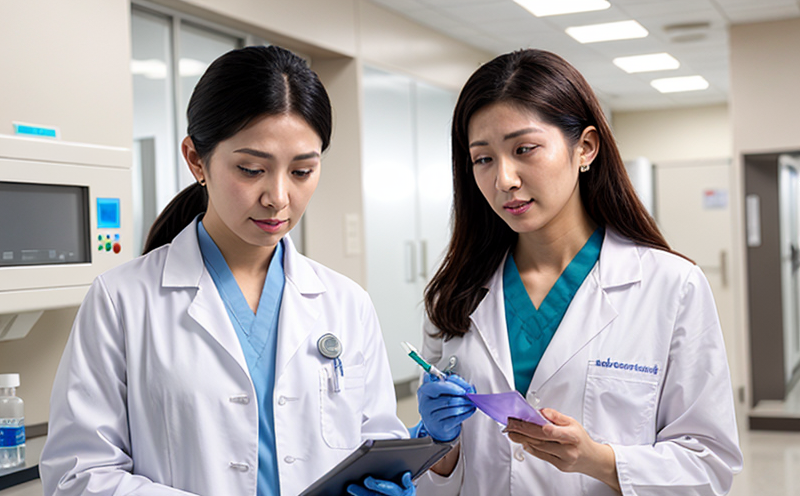EP Identity Testing of Biosimilars by Mass Spectrometry
The European Pharmacopoeia (EP) identity testing is a critical step in ensuring the quality and consistency of biosimilars. This service employs advanced mass spectrometric techniques to verify the identity of complex biologic medicines, which are characterized by their large protein structures. The process involves detailed analysis that ensures the structural integrity and purity of the drug substance (DS), thereby supporting regulatory compliance.
The importance of this testing cannot be overstated in today's pharmaceutical landscape where biosimilars play a pivotal role in healthcare delivery. Identifying discrepancies early on can prevent costly delays and ensure patient safety, which is paramount given the complex nature of these biologics.
Our EP identity testing service leverages state-of-the-art mass spectrometers to perform comprehensive analysis. These instruments offer high-resolution data allowing for precise structural characterizations of proteins within biosimilars. By comparing the observed spectra with reference standards, we can confirm that the substance meets all specified criteria laid out in the European Pharmacopoeia.
The methodology employed includes sample preparation procedures designed to minimize interference while maximizing sensitivity and specificity. This process typically involves denaturation steps followed by reconstitution prior to injection into the mass spectrometer. The resulting data provides valuable insights into not just the primary protein but also potential post-translational modifications (PTMs), which are crucial for understanding biological activity.
Regulatory bodies such as the European Medicines Agency (EMA) and FDA recognize these tests as essential tools in ensuring drug quality. Compliance with international standards like ICH Q6B further emphasizes the necessity of rigorous identity testing during development phases and post-marketing surveillance.
In addition to confirming identity, our service also evaluates other aspects critical for biosimilar development such as purity assessment using reverse phase high-performance liquid chromatography (RP-HPLC), stability studies under various conditions including temperature extremes, pH fluctuations, light exposure etc., all of which contribute towards establishing robust data packages necessary for approval.
By leveraging cutting-edge technology and adhering strictly to regulatory guidelines, our EP identity testing ensures accurate identification of biosimilars. This service is particularly valuable for companies developing new biologics or conducting comparability exercises aimed at demonstrating interchangeability between reference products and their respective biosimilar versions.
- Environmental Impact: Our laboratory practices are designed to minimize waste generation through efficient use of reagents and solvents, recycling where possible. Additionally, we adhere to strict disposal protocols for hazardous materials.
- Sustainability Efforts: We actively participate in initiatives promoting sustainable chemistry by utilizing greener alternatives when feasible without compromising on performance or results accuracy.
Why It Matters
The significance of EP identity testing cannot be understated, especially within the context of biosimilar development and production. Ensuring that a biosimilar is indeed identical to its reference product is crucial for maintaining efficacy and safety profiles expected from such treatments.
Given the complexity inherent in biopharmaceuticals due to factors like conformational diversity and glycosylation patterns, accurate identification becomes even more challenging. Any deviation could lead to unpredictable outcomes affecting both clinical trial success rates as well as patient response post-launch.
The EMA’s guidelines on biosimilar development highlight the importance of robust analytical methods capable of detecting minor differences between similar products. Our mass spectrometric approach goes beyond mere comparison; it enables us to provide detailed insights into structural features that might otherwise go unnoticed using simpler techniques.
Moreover, with increasing scrutiny from regulatory authorities worldwide regarding consistency and reliability in biologic medicines, having a reliable identity testing service is becoming increasingly important. It helps build trust among stakeholders – investors looking at long-term returns, healthcare providers concerned about patient outcomes, and most importantly consumers seeking safe and effective treatments.
International Acceptance and Recognition
The European Pharmacopoeia identity testing of biosimilars by mass spectrometry enjoys widespread acceptance internationally. Regulatory agencies around the world have recognized its value in ensuring consistent quality across different markets. Notably, the United States Food and Drug Administration (FDA) and the World Health Organization (WHO) endorse this approach as part of their global standards for biologic drug development.
Compliance with European Pharmacopoeia (EP) requirements is a key factor in gaining market access in Europe and beyond. This aligns perfectly with international standards like those set forth by ICH Q6B, which provides comprehensive guidance on quality attributes for biopharmaceutical products.
Biosimilar manufacturers seeking approval must demonstrate that their candidate meets all specified criteria, including identity testing via mass spectrometry. Failure to do so could result in delays or rejection during review processes conducted by various national authorities.
Our laboratory’s adherence to these stringent protocols ensures not only compliance but also enhances credibility among key stakeholders involved in biopharmaceutical research and manufacturing sectors worldwide.





